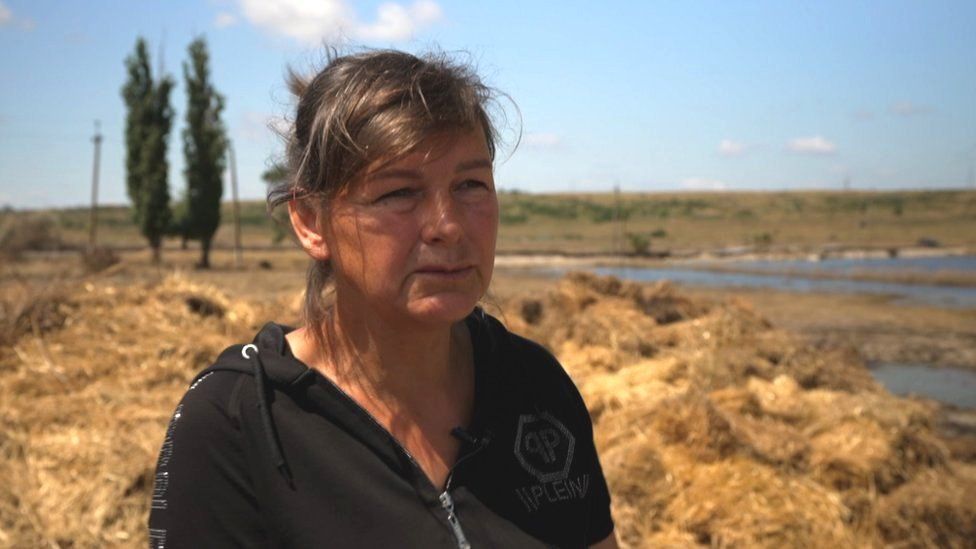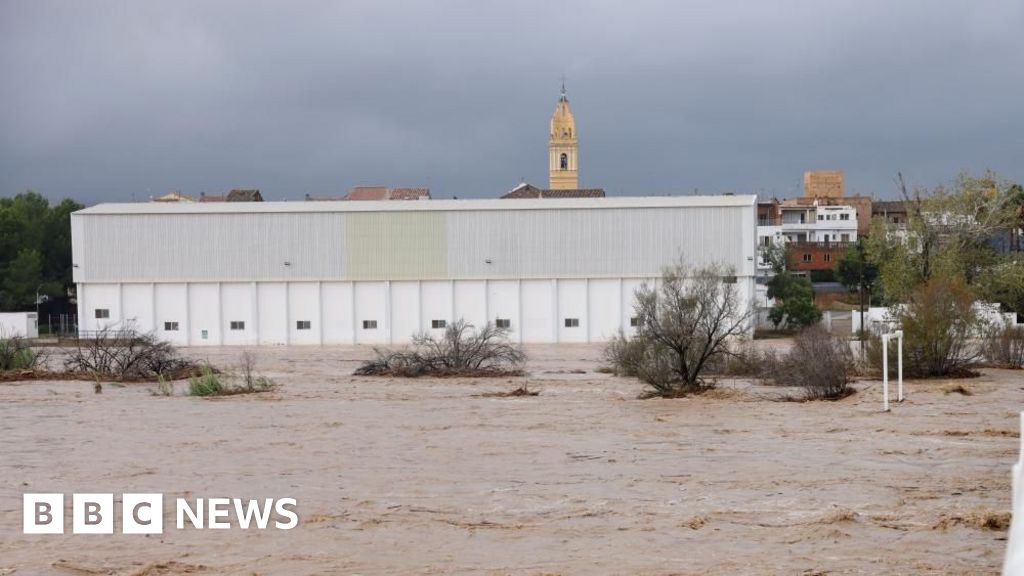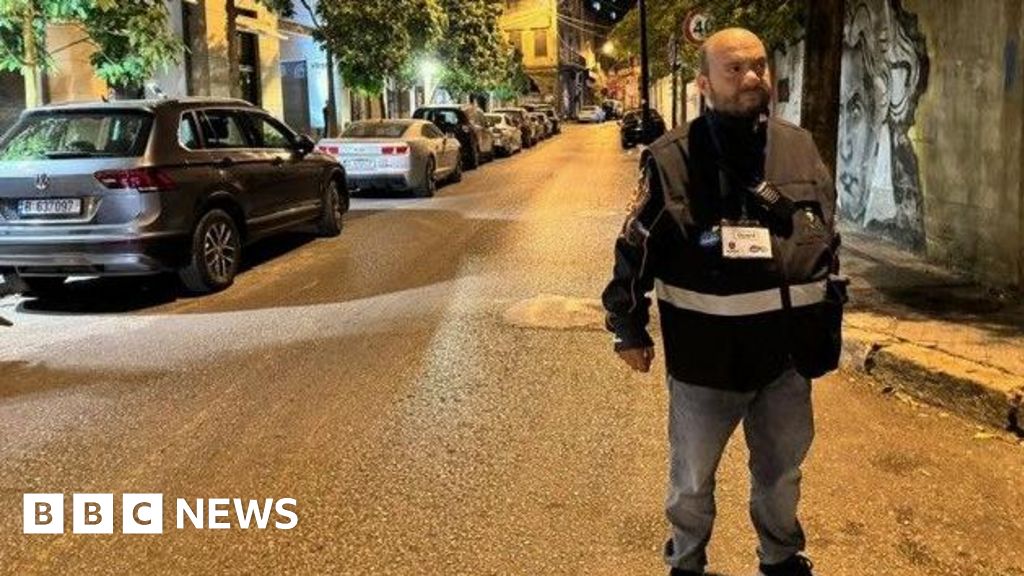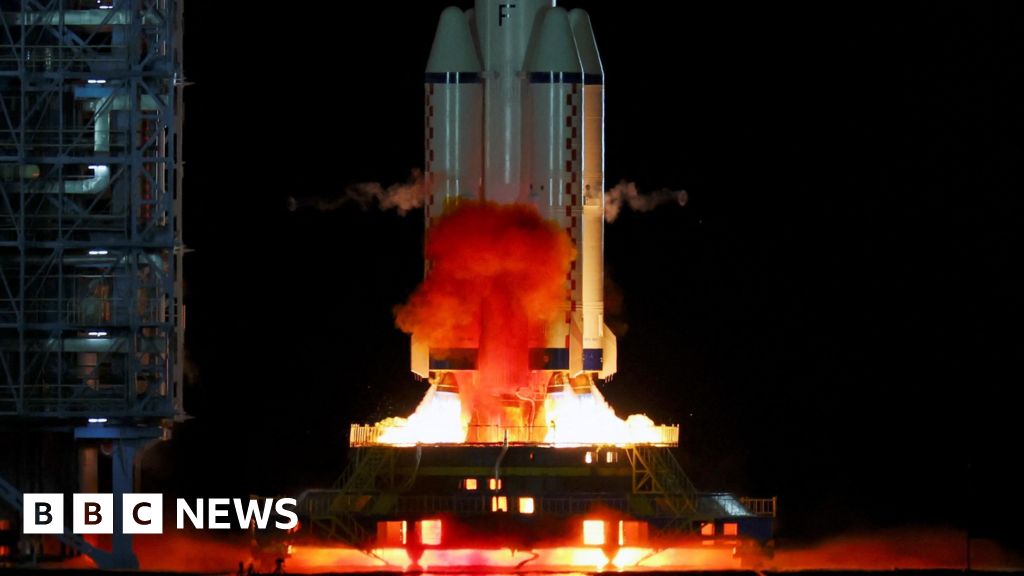ARTICLE AD BOX

Svitlana Kridiner's dairy farm in southern Ukraine was engulfed by water after the Kakhovka dam burst in June
Viktoriia Zhuhan in the south of Ukraine and Kateryna Khinkulova in London
BBC World Service
When Ukraine's Kakhovka dam was blown up in June, it led to devastating floods that destroyed homes and farmland, and left hundreds of thousands without drinking water. Four months on, Ukrainians are still facing water shortages but say they are determined to overcome the destruction.
When Svitlana Kridiner heard about the dam collapse, she knew it was only a matter of time before her village would be flooded. In the end it took two days for the water to reach her. It arrived at around 17:00 on 8 June.
"We packed quickly. We took our livestock - cows, dogs, ducklings - and our equipment: milking kits and a generator," she says. "We had to leave all our other possessions behind, they were all lost."
The 52-year-old farmer and her husband Vasyl had devoted their lives to their herd of two dozen cows, which they had raised from calves, and did everything they could to save them.
It took just five more hours for the water to engulf their whole farm. Their village, Afanasiivka, is 70km (45 miles) north of the dam and there are signs of damage everywhere.
Your device may not support this visualisation
Svitlana shows us water marks inside a barn, close to the ceiling, and explains that most of the hay she and her husband had prepared to feed their cows over the winter was destroyed. So was their other animal feed.
"The water rose by six metres, but at least the farm building survived," she says. "Only the floor got washed away but the walls are still standing."
On top of this, Svitlana's village is near the front line, and like many of the flood-hit areas is contaminated with ammunition. She shows us a rocket, stuck in the ground in one of her hay meadows. "My husband has to mow around it," she says.
A rocket is stuck in the middle of Svitlana's hay meadow which they now have to mow around
The Ukrainian government is offering her compensation for the flood damage, although she says the 5,000 Ukrainian hryvnia offered, equivalent to $135 or £110, is nowhere near enough to repair everything.
Somehow, she's not disheartened. "Maybe we will take out another loan, we will mow some hay for the cows or buy some more. We will make it, rest assured."
Her optimism is shared by another farmer we meet, Vadym Sheremet, who shows us round the ruins of his home in the village of Pavlo-Marianivka, 10km (six miles) away.
"Here we had a fireplace, where our family gathered," says the 52-year-old, pointing to a pile of bricks and chimney debris. "It was such a happy time," he trails off, remembering the old days.
Vadym Sheremet is having to rebuild his entire farm after flood-water hit
The water reached the roof of his house and destroyed his crops. Before the flood he grew wheat, barley and sunflowers. And this isn't the first time he has had to start again.
Vadym's village was under Russian occupation for much of 2022. "Last autumn we had 250 hectares of grain, ready to harvest. Russians burnt it all. That was the first blow," he says.
"Then spring 2023 came. We gave it our all and sowed, however hard it was. Then the water came. We were knocked down once again."
Your device may not support this visualisation
The impact of the dam explosion is so huge that it is described as "one of the biggest human-caused disasters of our time", in a report by US research institute, the Wilson Centre.
It also says that "more than one million hectares of land in three southern oblasts of Ukraine - Kherson, Zaporizhzhia and Dnipropetrovsk - will be unusable for the next three to five years for lack of a water supply".
Damage worth an estimated $2bn (£1.6bn) was caused by the breach, excluding the cost of rebuilding it, according to Ukrainian authorities. They said more than two-thirds of the affected area was in Russian-occupied territory where the flooding was worse because the bank on that side of the river is lower.
The Kakhovka dam held back a vast reservoir that supplied water to irrigate farms as well as provided drinking water. A report by the United Nations warns that there is unlikely to be enough rain to water farmers' crops, so people have been digging new wells and laying water supply lines with help from the authorities and aid groups.
With help from volunteers, Vadym is building a new house, ploughing his fields to prepare for the season ahead and plans to lay a new water supply to help his community.
"Everything will work out," says Vadim. "Life is wonderful. You can give in or become stronger."
Image source, Family handout
Image caption,Ivan Sheremet was killed by an explosive in southern Ukraine at the age of 20
Two days after we left Vadym's village he received some devastating news. His 20-year-old son, Ivan, was killed by an explosive by the side of a road, not far from his home. Vadim believes it was a Russian munition, although there is no way to confirm this at the moment.
Since Russia's invasion, Ukraine has become one of the most heavily mined countries in the world, according to the United Nations. The head of the Red Cross's weapon contamination unit, Erik Tollefsen, says the dam disaster dislodged mines, exacerbating the problem. "We knew where the hazards were. Now we don't. All we know is that they are somewhere downstream," he told the AFP news agency.
Impact of the dam breach
Image source, Reuters
Image caption,The Nova Kakhovka dam in Kherson collapsed unleashing a flood in southern Ukraine
- At least 58 people killed
- Up to 700,000 without access to clean water
- More than 30,000 homes in need of rebuild or repair
- Some 326,000 hectares of farmland left without irrigation
- Nearly 300km of roads destroyed
Source: Ukrainian government / UN estimates
Russia and Ukraine have blamed each other for the destruction of the dam.
Two days after it started to burst, a Norwegian agency analysed seismic signals from a regional station in Romania, which indicated an explosion at the same time the dam collapse was registered.
Experts with the international human rights law firm Global Rights Compliance, which is implementing Western-backed efforts to support accountability for atrocities in Ukraine, visited the Kherson region from 10 to 11 June with Ukraine's prosecutor general and a team from the International Criminal Court. The group concluded it was "highly likely" that Russia was behind the attack.
Despite everything that has happened, Vadym is determined to rebuild his life and his farm. He was too upset to talk straight after Ivan's death but eventually he called us from his courtyard, sitting with his back against his tractor. "My son was someone who could do anything," he said. And he vowed to keep strong for Ivan.
"We have to be strong. We have to live. We will make it," he says. "We are good people who deserve to live in a peaceful and flourishing Ukraine."

 1 year ago
16
1 year ago
16








 English (US)
English (US)